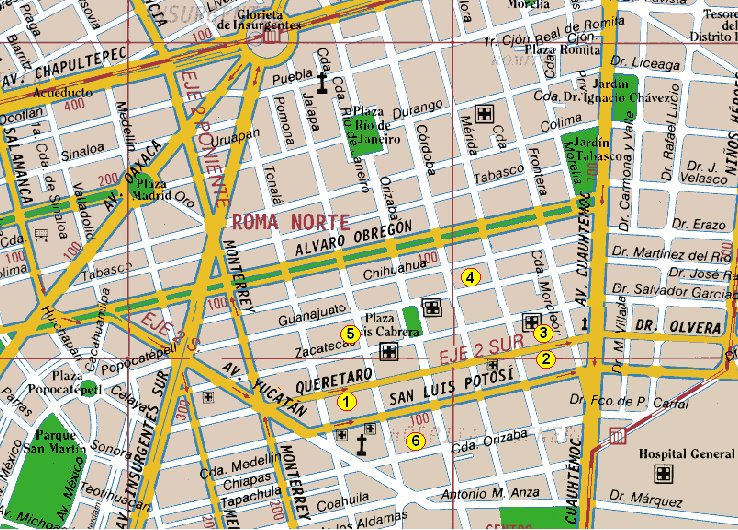Tuesday, December 05, 2006
Web page for nouns
http://www.e-spanyol.hu/en/grammar/gender.php
Feliz navidad!!!
See you on January 16th
Wednesday, November 29, 2006
Sexta clase
First activity: read the Spanish dialog and try to understand, then order the English Translation.
- •Buenas tardes, aquí tiene el menú.
- •Gracias .....
- •¿Qué desea ordenar?
- •Yo quiero una sopa de cebolla y un filete en salsa española, por favor
- •¿De beber?
- •Un jugo de naranja
- •Enseguida le traigo su orden ......
- •¿Desea algo más?
- •Si, la cuenta por favor.
- •In a moment I’ll bring you your order
- •To drink?
- •Thank you.
- •Anýthing else?
- •Good afternoon, here you have the menu.
- •Yes, the bill please.
- •What would you like to order?
- •Orange juice.
- •I’d like onion soup and a fillet in spanish sauce, please.
- •Good afternoon, here you have the menu.
- •Thank you....
- •What would you like to order?
- •I’d like onion soup and a fillet in spanish sauce, please.
- •To drink?
- •Orange juice.
- •In a moment I’ll bring you your order
- ....
- •Anýthing else?
- •Yes, the bill please.
Check the vocabulary in "vocabulario de comida" sheet.
Fajitas (pollo, pimiento, salsa)
Enchiladas (pollo con salsa de tomates y chile con tortillas)
Nachos (tortilla frita con guacamole o queso)
Tacos (carne en tortilla)
Empanadas (pasta rellena de carne)
3) We practice the dialog with a real menu from a mexican restaurant
4) We discuss about Latin-American beverages, do you know any?
Cerveza
Tequila
Mezcal
Horchata
Chocolate
5) We saw three videos from the bbc web page. you can check them in the link "BBC videos bebidas"
6) Grammar
Un = a (masculine)
Una = a (feminine)
Ejemplo:
Yo quiero una sopa de cebolla
Yo quiero un café
Sunday, November 26, 2006
Friday, November 24, 2006
Quinta Clase
1. Primero
2. Segundo
3. Tercero
4. Cuato
5. Quinto
6. Sexto
7. Séptimo
8. Octavo
9. Noveno
10. Décimo
2) Directions with ordinary numbers
Toma la segunda calle
Da vuelta a la izquierda en la tercera calle
Gira a la derecha en la quinta calle
Sigue derecho hasta la sexta calle
3) Exercise in pairs with two maps

 Practice giving directions from the yellow point to:
Practice giving directions from the yellow point to:C=cine
T=Teatro
F=Farmacia
Mu=Museo
M=Mercado
H=Hospital
B=Banco
S=Supermercado
4) Which is the correct form of the verb
remember the verbs ending with ar in present are conjugating like this:
Yo compro (comprar = to buy)
Tú compras
El compra
Nosotros compramos
Ustdes compran
Ellos compran
Exercise
5) Find the verbs in Spanish for the following images (a list of verbs given in class)
CHECK THE LIST OF VERBS IN THE PART VOCABULARIO

6) How to ask for hobbies
¿Qué haces en tu tiempo libre? o ¿Cuáles son tus pasatiempos?
Me gusta (I like) jugar tenis, leer, nadar y dormir.
7) Ask a classmate about his hobbies. Find the vocabulary you need in the list of verbs given.
Tuesday, November 14, 2006
Quinta clase
2) Articulos definidos
El (for masculine nouns)
La (for feminine nouns)
3) Al = a el
A la
Al mercado por favor
A la catedral por favor
4) How to ask for directions
Disculpe, ¿dónde está el museo de antropología?
Está en la calle Ramón Carrillo
¿Cómo llego?
Siga todo derecho, pase tres calles y gire a la izquierda.
Muchas gracias
De nada
5)Notas
Llegar = to arrive
Seguir= to continue
Pasar= to pass or to cross
Girar=to turn
Todo derecho=straight ahead
Derecha= right
Izquierda=left
Calle=street
Hasta= until
Dar vuelta= to turn
Tomar=to take
6)Instrucciones
7)Vocabulario
Museo
Cine
Teatro
Estación de tren
Estación de autobuses
Catedral
Escuela
Estadio
Supermercado
Plaza
Mercado
8) Mapa (check the image)
Practica dando instrucciones
9) Gramática
In Spanish there are three groups of verbs the first one is AR verbs
ejemplo: pasar, cruzar, tomar
yo paso
tú pasas
él pasa
nosotros pasamos
ustedes/ellos pasan
Practica con cruzar y tomar
10) No olvides practicar con el mapa Do not forget to practice with the map
Wednesday, November 08, 2006
Cuarta clase
2) We started learning how to ask for locations
¿Dónde está Chichen itza?
Está en México
¿Dónde está Machu pichu?
Está en Perú
¿Dónde está Varadero?
Está en Cuba?
¿Dónde están las Islas Galápagos? (with plural we say están)
Están en Ecuador.
3) Norte
Oeste Este
Sur
¿Dónde está México?
Está al norte de latinoamérica
¿Dónde esta Brasil?
Está al sur de latinoamérica
¿Dónde está Chile?
Está al suroeste de latinoamerica (we add suroeste, sureste, noroeste, noreste y centro)
¿Dónde está Panamá?
Está al centro de latinoamérica.
4) Preposiciones básicas
arriba de
abajo de
al lado de
entre ... y ...
a la derecha de
a la izquierda de
¿Dónde está Nicaragua?
Está arriba de Costa Rica.
¿Dónde está Panamá?
Está abajo de Costa Rica.
¿Dónde está Chile?
Está al lado de Argentina.
¿Dónde está Paraguay?
Está entre Brasil y Argentina.
¿Dónde está Belize?
Está a la derecha de Guatemala.
¿Dónde está Colombia?
Está a la izquierda de Venezuela.
5) We played a question and answer game with the location of latin-america countries.
Team=Equipo No se won
Wednesday, November 01, 2006
Tercera clase
2) How to ask for the age
¿Cuántos años tienes?
Tengo 28 años
3) Más números
See the vocabulary list (Números)
4) Report information
Ella tiene 28 años
El tiene 28 años
5) Pronombres personales
Yo
Tú
El / Ella
Nosotros
Vosotros (used in Spain but not in Latin-America)
Ustedes (you plural)
Ellos / Ellas
There is another pronoun, usted, used as you but in formal occasions, but it is not included in the normal chart, the conjugation is exactly the same as with El / Ella.
6) Conjugation of verbs Ser (to be) and Tener (to have)
Yo soy tengo
Tú eres tienes
El / Ella es tiene
Nosotros somos tenemos
Ustedes son tienen
Ellos / Ellas son tienen
7) The last activity was a review of personal information with a written conversation, using the questions:
¿Cómo te llamas?
¿Cómo estás?
¿Cuál es tu teléfono?
¿Cuál es tu ocupación?
¿De dónde eres?
¿Cuántos años tienes?
Monday, October 30, 2006
A gorgeous tradition in Mexico DIA DE MUERTOS
Tuesday, October 24, 2006
Segunda clase
Try to say this tongue twister and practice the sound R and rr
Tan caro es ese carro que por caro no compro el carro
1) Números 1-10
cero
uno
dos
tres
cuatro
cinco
seis
siete
ocho
nueve
diez
2) Teléfono
How to ask for telephone numbers
¿Cuál es tu teléfono?
Es 01245 78564
3) Ocupación
How to ask for occupation
¿Cuál es tu ocupación?
¿Qué haces?
Yo soy estudiante
4)¿Quién es?
Who is?
El es (nacionalidad, ocupación y nombre)
5) Estado marital
Marital status
Casado o Soltero
El es casado
Ella es soltera
Do not forget to practice the tongue twister and your telephone number for next class
Lista de verbos regulares
| Verbos regulares AR | |||
| Español | English | Español | English |
| Adivinar | To guess | Gastar | To spend |
| Amar | To love | Gustar | To like |
| Apagar | To turn off | Hablar | To talk, to speak |
| Aumentar | To increase | Hornear | To bake |
| Ayudar | To help | Invitar | To invite |
| Bailar | To dance | Jugar | To play |
| Besar | To kiss | Lavar | to wash |
| Cambiar | To change | Levantar | To lift |
| Cantar | To sing | Limpiar | To clean |
| Cocinar | To cook | Llamar | To call |
| Colgar | To hang | Llegar | To arrive |
| Comprar | To buy | Llevar | To take |
| Contar | To count | Llorar | To cry |
| Contestar | To answer | Matar | To kill |
| Cortar | To cut | Mirar | To see |
| Cuidar | To take care | Nadar | To swim |
| Dejar | To leave | Nevar | To snow |
| Deletrear | To spell | Odiar | To hate |
| Desayunar | To have breakfast | Olvidar | To forget |
| Descansar | To rest | Opinar | To think |
| Desear | To wish | Pagar | To pay |
| Despertar | To wake up | Pasear | To take a walk |
| Dibujar | To draw | Pensar | To think |
| Disfrutar | To enjoy | Pintar | To paint |
| Durar | To last | Practicar | To practice |
| Echar | To throw | Preguntar | To ask |
| Empezar | To start | Preparar | To prepare |
| Encontrar | To find | Prestar | To lend |
| Entrar | To enter | Recordar | To remember |
| Enviar | To send | Regalar | To give |
| Esperar | To wait | Reparar | To fix |
| Esquiar | To ski | Robar | To steal |
| Estudiar | To study | Saltar | To jump |
| Explicar | To explain | Terminar | To finish |
| Firmar | To sign | Tomar | To take |
| Fotografiar | To take photographs | Trabajar | To work |
| Fumar | To smoke | Usar | To use |
| Funcionar | To work | Visitar | To visit |
| Ganar | To earn, win | Volar | To fly |
| Verbos regulares ER | |||
| Español | English | Español | Ensglish |
| Agradecer | To thank | Llover | To rain |
| Beber | To drink | Nacer | To be born |
| Caber | To fit | Ofrecer | To offer |
| Caer | To fall | Perder | To lose |
| Comer | To eat | Prometer | To promise |
| Comprender | To understand | Recoger | To pick up |
| Coser | To sew | Romper | To break |
| Correr | To run | Sorprender | To surprise |
| Deber | To owe | Suceder | To happen |
| Escoger | To choose | Vender | To sell |
| Leer | To read | Volver | To come back |
| Verbos regulares IR | |||
| Español | English | Español | English |
| Abrir | To open | Partir | To cut, to break |
| Construir | To buld | Pedir | To ask |
| Corregir | To correct | Prohibir | To prohibit |
| Decidir | To decide | Recibir | To receive |
| Despedir | To see off, to fire | Seguir | To follow |
| Discutir | To discuss | Subir | To go up |
| Dormir | To sleep | Unir | To join |
| Escribir | To write | Vivir | To live |
| Mentir | To lie | | |
